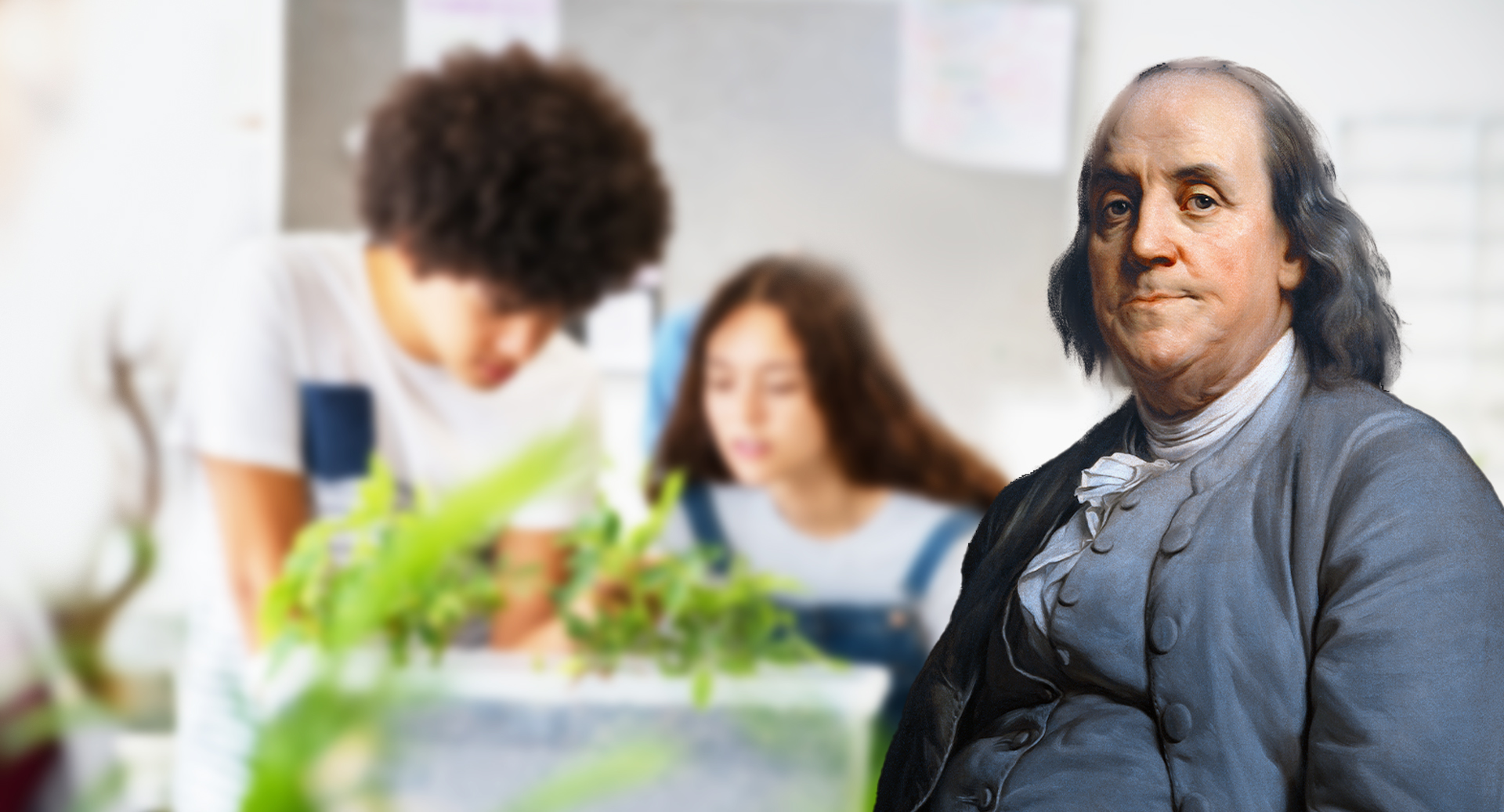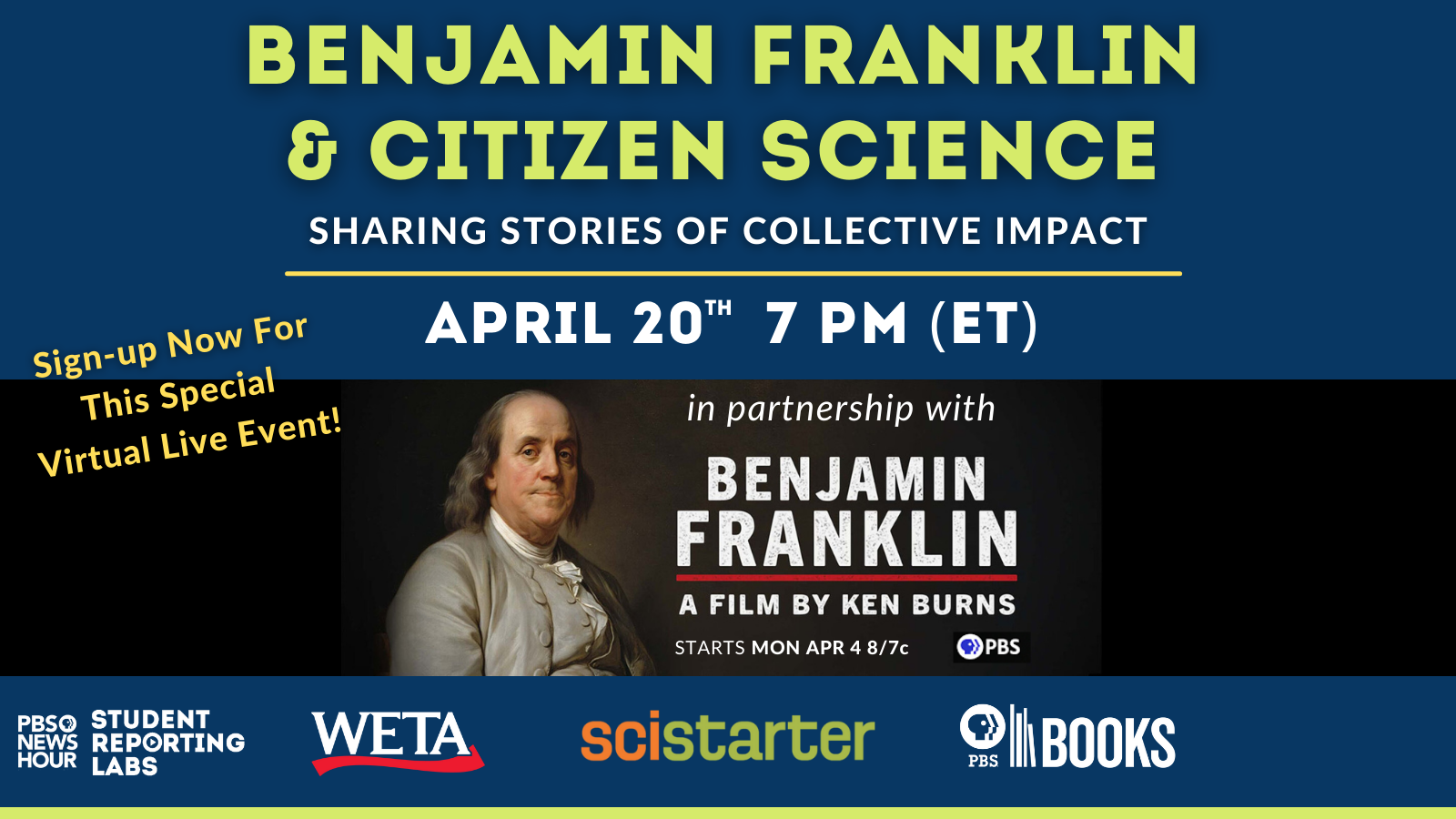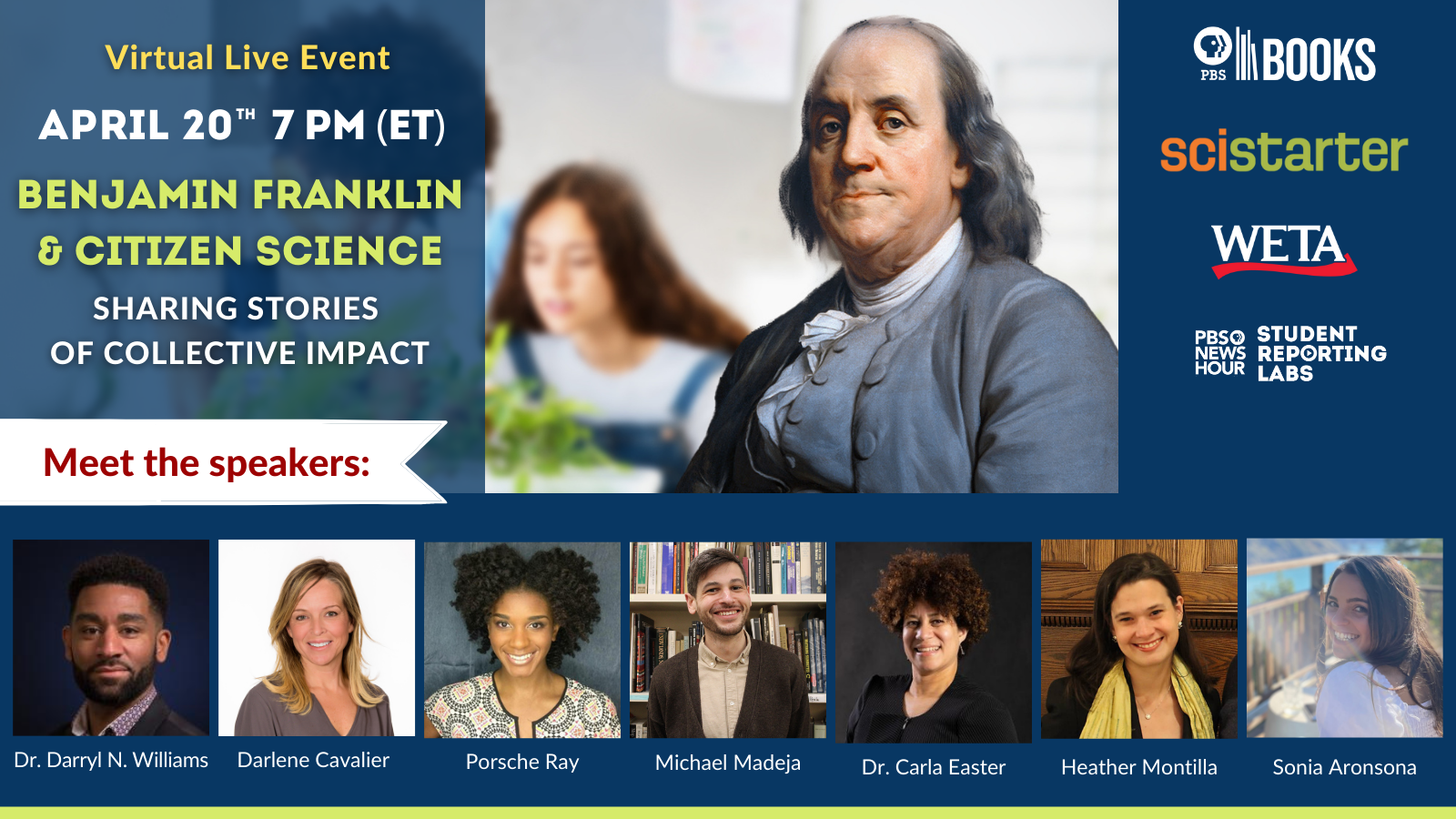
Benjamin Franklin was always curious. He loved to explore the world around him — just like the citizen scientists of today! We’re celebrating Ben Franklin this month in honor of Citizen Science Month and the new two part Ken Burns documentary, Benjamin Franklin, out now on PBS.
And on April 20 at 7 pm ET, SciStarter will be joining PBS Books and the PBS NewsHour Student Reporting Labs for a free, virtual program all about Ben Franklin the citizen scientist. We’ll discuss the new Ken Burns film, why Ben Franklin is relevant today and how anyone can gather data about their world to advance science! Come listen to speakers from the Smithsonian, SciStarter, climate scientists, student reporters and more. We’ll also hear from young student citizen scientists about how they’ve gotten involved, and walk you through ways to get involved yourself.
Register for “Benjamin Franklin & Citizen Science” now!
18th century citizen scientist
Benjamin Franklin was born in Boston in 1706, just over 300 years ago. As a young man, he set up shop as a printer in Philadelphia, making and selling books and pamphlets to citizens. Later, he would become active in the fight for American independence, and is one of our nation’s Founding Fathers.
Franklin did a lot in his lifetime! Among his best-known achievements are signing the Declaration of Independence, flying a kite in a lightning storm and advocating for the wild turkey, not the bald eagle, as our national symbol. Franklin was also the first U.S. Postmaster General, the first ambassador to France and he founded the University of Pennsylvania. And let’s not forget Franklin the inventor: He’s credited with the lightning rod and bifocal eyeglasses, among other inventions.
But above all, Franklin’s most defining trait was his curiosity. He pursued many different subjects including politics, international diplomacy, writing, publishing, philosophy and, our personal favorite, science — just because he was interested. Franklin’s work didn’t happen in a vacuum, though. His work drew from and added to the work of other scientists and curious people in the U.S. and beyond. In fact, Franklin’s observations were often disseminated far and wide for many others to build upon — just like citizen science observations today!
When he noticed significant speed differences between trans-Atlantic shipping routes of similar lengths, he consulted with his cousin Timothy Folger, a ship captain. Folger filled him in on the “warm, strong” current that wise ship captains used to cross the Atlantic. Using details from Folger, Franklin gave the Gulf Stream its name and became the first to chart its course.
He was one of the first to investigate that storms didn’t always travel in the direction of prevailing winds, a concept still foundational to meteorology today. He dabbled in topics like electromagnetism, refrigeration and how volcanic eruptions can affect the Earth’s climate.
He even observed the 1769 transit of Venus – with two peers – and published it in the journal Philosophical Transactions of the Royal Society (which still exists today), which is credited as the first scientific publication by an American. It was a big event in Franklin’s time, and other curious citizen scientists made the same observation around the world. The famous Captain Cook even traveled to Tahiti with an astronomer to see it!
Franklin was constantly inspired by his observations of the world around him. Gathering observations of the world around you is foundational to science – and it’s also fun! Today, citizen scientists around the world find ways to engage their curiosity and make real impacts on scientific research despite not being formally trained or employed as scientists – just like Franklin. That’s because the most important part of being a citizen scientist is being curious and making observations, which is something anybody can do.

Join us on April 20 for a free event on Benjamin Franklin
To celebrate and learn more about Ben Franklin the citizen scientist, come join us at our free, virtual event during Citizen Science Month. We’ll be joining PBS Books and the PBS NewsHour Student Reporting Labs to watch a trailer for the new Ken Burns Benjamin Franklin documentary on PBS, talk about Franklin’s impact and hear from an awesome group of speakers
You’ll meet presenters like Michael Madeja from the American Philosophical Society’s Library & Museum, and curator of the virtual Dr. Franklin, Citizen Scientist exhibit. We’ll also hear from Sonia Aronson, a former student reporter who’s now a climate scientist, and Carla Easter from the Smithsonian National Museum of Natural History. Porsche Ray from EarthEcho International will share a fun and easy environmental project to do while jogging, and Student reporters from the PBS NewsHour Student Reporting Labs will present their pieces on Ben Franklin and citizen science. Finally, SciStarter’s founder Darlene Cavalier will tell us more about citizen science, including what you’ll find in The Field Guide to Citizen Science. Don’t miss this great event!
Register for “Benjamin Franklin & Citizen Science!”
Celebrate Ben Franklin with citizen science
Embracing your inner Ben Franklin and becoming a citizen scientist is easy. No need to discover a whole new ocean current — today, there are simple tools anyone can use to study the world and do real science.
To get started, head to SciStarter.org. You’ll find thousands of citizen science projects to choose from (as well as curated lists that will narrow it down, if you want some suggestions). If you make an account, we’ll track your contributions and make personalized recommendations for new projects you can try. You can also sign up for our email newsletter, where you’ll hear about a new batch of special featured projects about twice per month.
If you’re totally new to citizen science, check out our short training course to get you started! In just an hour, we’ll walk you through the basics of citizen science, how to get started with SciStarter and test out two great projects together.
Ready to go? We’ve picked out three projects we think Ben Franklin fans will especially like!
Water Heroes Ploggers Campaign
Ben Franklin often made observations of the world around him, then used what he saw to figure out what people needed (like bifocals) or to solve a problem (like shipping across the Gulf Stream). In this day and age, we have different needs and problems than Franklin did in the 18th century. Like litter.
Have you ever heard of “plogging?” It’s picking up litter while jogging (or walking, or running)! EarthEcho International is hosting a special citizen science challenge now through Earth Day (April 22) asking everyone to go for a plog and pick up any trash you see. But it’s more than just cleaning up your neighborhood: Researchers want to know what you found! Your observations of the numbers and types of items you find, even brand names, will help inform plans to cut down on litter as well as help researchers understand litter’s impacts.
GLOBE Observer: Clouds
Let’s skip the lightning storm and look to the skies on a nicer day with NASA’s GLOBE Observer: Clouds project. NASA scientists have gobs of data about clouds that they’ve collected from satellites. But clouds often look different when seen from the ground. These scientists need your cloud observations so they can compare it to their satellite data and learn more about clouds and weather patterns!
Stream Selfie
Scientists are building a national map of streams, and they need your help to populate it with information about stream health. The observations they need are super easy to get: Just snap a selfie! Researchers can tell quite a bit from just an image of a stream, so your contributions will help them understand the condition of our country’s waterways.
More ways to get involved
Anyone can follow their curiosity, just like Ben Franklin. And today it’s easier than ever, since there are so many ways to get involved — especially during Citizen Science Month! Head over to CitizenScienceMonth.org for more events and featured projects. It’s a great way to jump start your citizen science journey, learn about science, meet people and make a difference!


